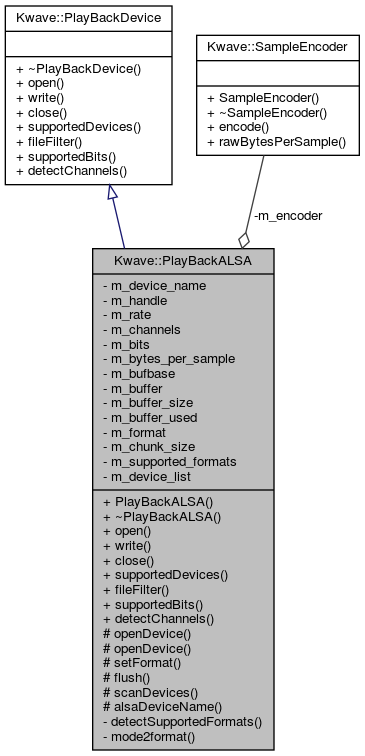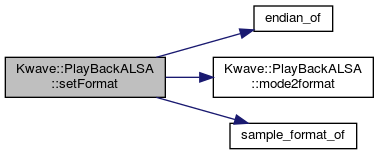#include <PlayBack-ALSA.h>


Public Member Functions | |
| PlayBackALSA () | |
| virtual | ~PlayBackALSA () Q_DECL_OVERRIDE |
| virtual QString | open (const QString &device, double rate, unsigned int channels, unsigned int bits, unsigned int bufbase) Q_DECL_OVERRIDE |
| virtual int | write (const Kwave::SampleArray &samples) Q_DECL_OVERRIDE |
| virtual int | close () Q_DECL_OVERRIDE |
| virtual QStringList | supportedDevices () Q_DECL_OVERRIDE |
| virtual QString | fileFilter () Q_DECL_OVERRIDE |
| virtual QList< unsigned int > | supportedBits (const QString &device) Q_DECL_OVERRIDE |
| virtual int | detectChannels (const QString &device, unsigned int &min, unsigned int &max) Q_DECL_OVERRIDE |
 Public Member Functions inherited from Kwave::PlayBackDevice Public Member Functions inherited from Kwave::PlayBackDevice | |
| virtual | ~PlayBackDevice () |
Protected Member Functions | |
| snd_pcm_t * | openDevice (const QString &device) |
| int | openDevice (const QString &device, unsigned int rate, unsigned int channels, unsigned int bits) |
| int | setFormat (snd_pcm_hw_params_t *hw_params, unsigned int bits) |
| int | flush () |
| void | scanDevices () |
| QString | alsaDeviceName (const QString &name) |
Private Member Functions | |
| QList< int > | detectSupportedFormats (const QString &device) |
| int | mode2format (int bits) |
Private Attributes | |
| QString | m_device_name |
| snd_pcm_t * | m_handle |
| double | m_rate |
| unsigned int | m_channels |
| unsigned int | m_bits |
| unsigned int | m_bytes_per_sample |
| unsigned int | m_bufbase |
| QByteArray | m_buffer |
| unsigned int | m_buffer_size |
| unsigned int | m_buffer_used |
| snd_pcm_format_t | m_format |
| snd_pcm_uframes_t | m_chunk_size |
| QList< int > | m_supported_formats |
| Kwave::SampleEncoder * | m_encoder |
Static Private Attributes | |
| static QMap< QString, QString > | m_device_list |
Detailed Description
Definition at line 45 of file PlayBack-ALSA.h.
Constructor & Destructor Documentation
◆ PlayBackALSA()
| Kwave::PlayBackALSA::PlayBackALSA | ( | ) |
Default constructor
Definition at line 191 of file PlayBack-ALSA.cpp.
◆ ~PlayBackALSA()
|
virtual |
Destructor
Definition at line 211 of file PlayBack-ALSA.cpp.
References close().

Member Function Documentation
◆ alsaDeviceName()
|
protected |
Translate a verbose device name into a ALSA hardware device name.
- Parameters
-
name verbose name of the device
- Returns
- device name that can be used for snd_pcm_open()
Definition at line 862 of file PlayBack-ALSA.cpp.
References _, DBG, m_device_list, name, and scanDevices().
Referenced by openDevice().


◆ close()
|
virtual |
Closes the output device.
- See also
- PlayBackDevice::close
Implements Kwave::PlayBackDevice.
Definition at line 720 of file PlayBack-ALSA.cpp.
References flush(), m_encoder, m_handle, and m_supported_formats.
Referenced by ~PlayBackALSA().


◆ detectChannels()
|
virtual |
Detect the minimum and maximum number of channels. If the detection fails, minimum and maximum are set to zero.
- Parameters
-
device filename of the device min receives the lowest supported number of channels max receives the highest supported number of channels
- Returns
- zero or positive number if ok, negative error number if failed
Reimplemented from Kwave::PlayBackDevice.
Definition at line 965 of file PlayBack-ALSA.cpp.
References ALSA_MALLOC_WRAPPER, m_handle, and openDevice().

◆ detectSupportedFormats()
|
private |
Walk through the list of all known formats and collect the ones that are supported into "m_supported_formats".
Definition at line 283 of file PlayBack-ALSA.cpp.
References _known_formats, ALSA_MALLOC_WRAPPER, m_handle, m_supported_formats, and openDevice().
Referenced by open(), and supportedBits().


◆ fileFilter()
|
virtual |
return a string suitable for a "File Open..." dialog
Reimplemented from Kwave::PlayBackDevice.
Definition at line 903 of file PlayBack-ALSA.cpp.
References _.
◆ flush()
|
protected |
Writes the output buffer to the device
Definition at line 641 of file PlayBack-ALSA.cpp.
References m_buffer, m_buffer_size, m_buffer_used, m_bytes_per_sample, m_channels, m_chunk_size, m_format, m_handle, m_rate, Kwave::toInt(), and Kwave::toUint().
Referenced by close(), and write().


◆ mode2format()
|
private |
create a ALSA device format (enum) from parameters.
- Parameters
-
bits the number of bits per sample, related to the decoded stream
- Returns
- the index of the best matching format within the list of known formats, or -1 if no match was found
Definition at line 261 of file PlayBack-ALSA.cpp.
References _known_formats, and m_supported_formats.
Referenced by setFormat().

◆ open()
|
virtual |
Opens the device for playback.
- See also
- PlayBackDevice::open
Implements Kwave::PlayBackDevice.
Definition at line 540 of file PlayBack-ALSA.cpp.
References DBG, detectSupportedFormats(), m_bits, m_bufbase, m_buffer, m_buffer_size, m_buffer_used, m_bytes_per_sample, m_channels, m_chunk_size, m_device_name, m_encoder, m_handle, m_rate, m_supported_formats, openDevice(), and Kwave::toUint().

◆ openDevice() [1/2]
|
protected |
Opens a physical device and returns its file descriptor (short version, used for probing / detecting)
- Parameters
-
device filename of the device
- Returns
- pcm stream or null pointer on errors
Definition at line 909 of file PlayBack-ALSA.cpp.
References _, alsaDeviceName(), DBG, and m_handle.
Referenced by detectChannels(), detectSupportedFormats(), and open().


◆ openDevice() [2/2]
|
protected |
Open the device and set all internal member variables that need to be initialized for playback.
- Parameters
-
device name of the ALSA device rate sample rate, rounded as unsigned int channels number of tracks/channels to use bits number of bits per sample
- Returns
- zero or positive if succeeded, or negative error code if failed
Definition at line 343 of file PlayBack-ALSA.cpp.
References _, ALSA_MALLOC_WRAPPER, alsaDeviceName(), DBG, m_channels, m_chunk_size, m_handle, m_rate, and setFormat().

◆ scanDevices()
|
protected |
scan all ALSA devices, re-creates m_device_list
Definition at line 739 of file PlayBack-ALSA.cpp.
References _, ALSA_MALLOC_WRAPPER, DBG, DEFAULT_DEVICE, m_device_list, name, NULL_DEVICE, and Kwave::toInt().
Referenced by alsaDeviceName(), and supportedDevices().


◆ setFormat()
|
protected |
Used in "openDevice()" to set the member variables m_format, m_bytes_per_sample and m_bits according the given resolution in bits per sample. The number of bits per sample will be rounded up to the next multiple of 8. m_handle must already be an opened device.
- Parameters
-
hw_params valid ALSA hardware parameters bits number of bits per sample [1...32]
- Returns
- zero or positive if succeeded, or negative error code if failed
Definition at line 217 of file PlayBack-ALSA.cpp.
References _known_formats, endian_of(), m_bits, m_bytes_per_sample, m_channels, m_encoder, m_format, m_handle, mode2format(), and sample_format_of().
Referenced by openDevice().


◆ supportedBits()
|
virtual |
returns a list of supported bits per sample resolutions of a given device.
- Parameters
-
device filename of the device
- Returns
- list of supported bits per sample, or empty on errors
Implements Kwave::PlayBackDevice.
Definition at line 940 of file PlayBack-ALSA.cpp.
References _known_formats, and detectSupportedFormats().

◆ supportedDevices()
|
virtual |
return a string list with supported device names
Reimplemented from Kwave::PlayBackDevice.
Definition at line 884 of file PlayBack-ALSA.cpp.
References _, DEFAULT_DEVICE, m_device_list, NULL_DEVICE, and scanDevices().

◆ write()
|
virtual |
Writes an array of samples to the output device.
- See also
- PlayBackDevice::write
Implements Kwave::PlayBackDevice.
Definition at line 615 of file PlayBack-ALSA.cpp.
References Kwave::SampleEncoder::encode(), flush(), m_buffer, m_buffer_size, m_buffer_used, m_bytes_per_sample, m_channels, m_encoder, and MEMCPY.

Member Data Documentation
◆ m_bits
|
private |
Resolution in bits per sample
Definition at line 190 of file PlayBack-ALSA.h.
Referenced by open(), and setFormat().
◆ m_bufbase
|
private |
◆ m_buffer
|
private |
buffer with raw device data
Definition at line 202 of file PlayBack-ALSA.h.
◆ m_buffer_size
|
private |
Buffer size on bytes
Definition at line 205 of file PlayBack-ALSA.h.
◆ m_buffer_used
|
private |
number of bytes in the buffer
Definition at line 208 of file PlayBack-ALSA.h.
◆ m_bytes_per_sample
|
private |
Number of bytes per sample, already multiplied with the number of channels (m_channels)
Definition at line 196 of file PlayBack-ALSA.h.
Referenced by flush(), open(), setFormat(), and write().
◆ m_channels
|
private |
Number of channels
Definition at line 187 of file PlayBack-ALSA.h.
Referenced by flush(), open(), openDevice(), setFormat(), and write().
◆ m_chunk_size
|
private |
number of samples per period
Definition at line 214 of file PlayBack-ALSA.h.
Referenced by flush(), open(), and openDevice().
◆ m_device_list
|
staticprivate |
dictionary for translating verbose device names into ALSA hardware device names (key = verbose name, data = ALSA hardware device name)
Definition at line 221 of file PlayBack-ALSA.h.
Referenced by alsaDeviceName(), scanDevices(), and supportedDevices().
◆ m_device_name
|
private |
◆ m_encoder
|
private |
encoder for conversion from samples to raw
Definition at line 232 of file PlayBack-ALSA.h.
Referenced by close(), open(), setFormat(), and write().
◆ m_format
|
private |
sample format, used for ALSA
Definition at line 211 of file PlayBack-ALSA.h.
Referenced by flush(), and setFormat().
◆ m_handle
|
private |
Handle of the output device
Definition at line 181 of file PlayBack-ALSA.h.
Referenced by close(), detectChannels(), detectSupportedFormats(), flush(), open(), openDevice(), and setFormat().
◆ m_rate
|
private |
Playback rate [samples/second]
Definition at line 184 of file PlayBack-ALSA.h.
Referenced by flush(), open(), and openDevice().
◆ m_supported_formats
|
private |
list of supported formats of the current device, indices in the global list of known formats. Only valid after a successful call to "open()", otherwise empty
Definition at line 229 of file PlayBack-ALSA.h.
Referenced by close(), detectSupportedFormats(), mode2format(), and open().
The documentation for this class was generated from the following files:
- plugins/playback/PlayBack-ALSA.h
- plugins/playback/PlayBack-ALSA.cpp
